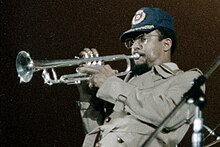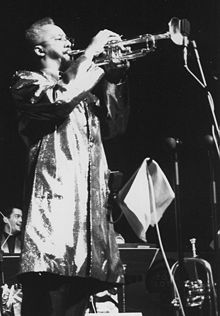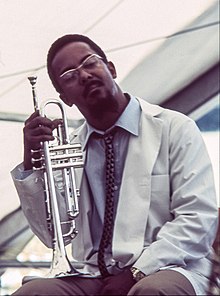Lester Bowie
William Lester Bowie (born October 11, 1941 in Frederick , Maryland , † November 8, 1999 in Brooklyn ) was an American jazz trumpeter , band leader and composer .
Life
Bowie grew up as part of the "Bowie Clan" in Little Rock and St. Louis , where he learned cornet and trumpet at an early age and played in school bands. His father was a trumpeter and led a house band; his brother Byron was a saxophonist and brother Joe played the trombone. His first band was called Continentals (1954); first appearances as an accompanist for doo-wop groups followed. Bowie studied at Lincoln University in St. Louis and North Texas State University in Dallas . There he played u. a. with James Clay , Billy Harper and David Newman , but appeared in this phase mainly with Oliver Lake , Joe Tex and Jimmy Forrest . While doing military service in the Texas Air Force (1958-60) he appeared in nightclubs and played in army and rhythm 'n' blues bands, among others. a. with his future wife, the singer Fontella Bass , who was a band singer for Oliver Sein.
In the early 1960s he was a member of various R&B bands that performed in the southern and midwestern United States, such as Little Milton , Albert King ; During this time he toured with circus bands and worked as a studio musician on R&B recordings for the Chess label in 1964/65 . Around 1964 he returned to St. Louis and led a hard bop formation together with drummer Phillip Wilson . In 1966 he moved to Chicago and was one of the founding members of the Association for the Advancement of Creative Musicians (AACM), an African American music association, of which he became vice chairman. Bowie also helped found the Black Artists Group and the Great Black Music Orchestra in St. Louis; he also played in 1979 in New York in the resulting Human Arts Ensemble .
In Chicago, Bowie was part of Roscoe Mitchell's band and also worked on his debut album for Delmark ; With him, as well as with Joseph Jarman and Malachi Favors , he founded one of the leading free jazz ensembles, the Art Ensemble of Chicago , with which he made numerous records and toured regularly, at the end of the 1960s . a. 1969 to Europe for the first time. During this time he also worked on recordings a. a. by Archie Shepp ( Blasé ), Sunny Murray , Jimmy Lyons , and Cecil Taylor with. His extensive composition Gettin 'to Know Y' All , premiered by the 50-strong Baden-Baden Free Jazz Orchestra, premiered in 1969 and was re-performed in 1970 at the Frankfurt Jazz Festival.
In the 1970s he was also active with his own projects, such as Serious Fun , and also participated in some rock jazz recordings. In 1974 he went on tour to Senegal and played there with local drummers. At the end of the decade he played with John Abercrombie and Eddie Gomez in the formation New Directions of drummer Jack DeJohnette , as well as in 1977 with David Murray , the Luther Thomas Creative Ensemble and in 1978 with Wadada Leo Smith ( Divine Love ). In 1979 he appeared in the 59-member Sho Nuff Orchestra in New York, with which, however, no recordings were made.
In the early 1980s, Bowie experimented with his band project From Roots to the Source , which "spanned Africa and gospel songs to contemporary jazz." Bowie said:

- “Our black music tradition doesn't just go back to New Orleans . It's thousands of years old. We try to express that with our music. "
In the 1980s, after experimenting with wind ensembles between five and 59 people, the popular Brass Fantasy was founded , the artistically leading among the new jazz brass bands emerging at the time. He also played in the New York Hot Trumpet Repertory Orchestra in 1983 with Wynton Marsalis and Ray Copeland . Together with Arthur Blythe , Chico Freeman and Don Moye , he was a member of the all-star formation The Leaders in 1986 . In 1990 he recorded the album My Way with his big band Brass Fantasy , which was released by DIW ; In 1992 the album The Fire This Time followed , which is considered to be his most successful work. The music of Brass Fantasy followed the traditions of the marching bands of early New Orleans jazz . Bowie organized an organ ensemble with Amina Claudine Myers ; with his wife Fontella Bass he recorded various records. Another orchestral work by Bowie premiered in New York's Town Hall . He wrote the theme music for the Bob Crosby show (1990) and recorded film scores with Philippe Sarde in the early 1990s ; he also worked with Malachi Thompson (1994) and James Carter ( Conversin 'with the Elders ; 1995/96). As a studio musician, he also recorded with namesake David Bowie . Lester Bowie died of liver cancer in 1999.
One of his younger brothers is the trombonist Joseph Bowie , the founder of the punk-funk-jazz band Defunkt .
Appreciation

Lester Bowie was voted best trumpeter in 1982 by the critical poll of the jazz magazine Down Beat ; Joachim-Ernst Berendt described him as " Cootie Williams of the avant-garde"; “His art of shaping and changing the trumpet tone seems inexhaustible.” Martin Kunzler named “ Rex Stewart's half-open valves” as additional points of reference , “in his playing the New Orleans mood is evoked just as much as the Duke Ellington atmosphere” suggest the influences of Miles Davis and Don Cherry . According to Carlo Bohländer , Bowie combines free jazz, African music and gospel in his compositions . and rhythm & blues elements.
Ian Carr described him as a "flamboyant performer with a flair for comedy and music parody, who was responsible for the theatrical elements at the concerts of the Art Ensemble." He is also a "great trumpeter with a nice round tone and technique and imagination", which encompasses an entire trumpet tradition ranging from Bubber Miley's growls to the modern varieties and improvisational field of blues , popular songs and serious abstraction. Carr remarked that the "danger in Bowie's theatrics" was to cover up an occasional emptiness in the musical statement. That was often the case with brass fantasy music ; and his growls, babbling and other mannerisms could then be boring because they did not express a genuine feeling or creative idea.
According to Richard Cook and Brian Morton , Bowie was "a great renegade of music and a passionate critic of jazz conservatism of the 1980s and 1990s".
One of the musicians who followed up on Bowie's achievements was J.-E. Berendt et al. a. Olu Dara , Baikida Carroll , Herb Robertson , Rasul Siddik , Stanton Davis and Paul Smoker .
Discographic notes
- Mirage ( Muse Records , 1974-82) with Julius Hemphill , John Stubblefield , John Hicks , Cecil McBee , Charles Bobo Shaw , Don Moye
- The Fifth Power ( Black Saint , 1978) with Arthur Blythe , Amina Claudine Myers , Malachi Favors, Phillip Wilson
- Urban Bushmen (ECM; 1981) with Art Ensemble of Chicago
- The Great Pretender (ECM; 1981) with Hamiet Bluiett , Fred Williams
- I Only Have Eyes for You (ECM; 1985) with Brass Fantasy
- Serious Fun (DIW, 1989), with Stanton Davis , Steve Turré , Frank Lacy , Vincent Chancey , Bob Stewart , Vinnie Johnson , Don Moje, d. i. the brass fantasy
- The Organizer (DIW, 1991) with Steve Turré, James Carter , Amina Claudina Myers, Phillip Wilson, Don Moje
- The Fire This Time ( In + Out , 1992)
- The Odysee of Funk and Popular Music Vol. 1 (Birdology, 1997) with Joseph Bowie, Gary Valente , Bob Stewart
- When the Spirit Returns (Dreyfus, 1997)
Web links
- Lester Bowie at Allmusic (English)
Lexical entries
- Joachim Ernst Berendt and Günther Hoesmann: Das Jazzbuch . Frankfurt / M .; Fischer TB
- Carlo Bohländer , Karl Heinz Holler, Christian Pfarr: Reclam's Jazz Guide . 5th, revised and supplemented edition. Reclam, Stuttgart 2000, ISBN 3-15-010464-5 .
- Ian Carr , Digby Fairweather , Brian Priestley : Rough Guide Jazz. The ultimate guide to jazz music. 1700 artists and bands from the beginning until today. Metzler, Stuttgart / Weimar 1999, ISBN 3-476-01584-X .
- Richard Cook , Brian Morton : The Penguin Guide to Jazz Recordings . 8th edition. Penguin, London 2006, ISBN 0-14-102327-9 .
- Leonard Feather , Ira Gitler : The Biographical Encyclopedia of Jazz. Oxford University Press, New York 1999, ISBN 0-19-532000-X .
- Martin Kunzler : Jazz Lexicon. Volume 1: A – L (= rororo-Sachbuch. Vol. 16512). 2nd Edition. Rowohlt, Reinbek near Hamburg 2004, ISBN 3-499-16512-0 .
Remarks
- ↑ Cook and Morton awarded it the highest rating in 1993 in the second edition of their Penguin Guide to Jazz (as the only Bowie album). Ian Carr also emphasized the "excellent arrangements (..) and the great ensemble playing". In Night Life , EJ Allen's trumpet solo almost overshadows the performance of the leader Bowie. See Carr: Rough Guide: Jazz , p. 69.
Individual evidence
- ↑ a b c d Kunzler, p. 140 f.
- ↑ a b c d e Feather & Gitler, p. 73
- ↑ a b c d e f Ian Carr, p. 68 f.
- ↑ a b c Cf. Cook & Morton, 168 f.
- ↑ a b c d Berendt and Huesmann, 271 f.
- ↑ Bohländer, p. 58 f.
- ↑ Note from Carr (Rough Guide: Jazz) and Cook & Morton (Penguin Guide to Jazz)
| personal data | |
|---|---|
| SURNAME | Bowie, Lester |
| ALTERNATIVE NAMES | Bowie, William Lester (full name) |
| BRIEF DESCRIPTION | American jazz trumpeter, bandleader and composer |
| DATE OF BIRTH | October 11, 1941 |
| PLACE OF BIRTH | Frederick , Maryland |
| DATE OF DEATH | November 8, 1999 |
| Place of death | Brooklyn |

